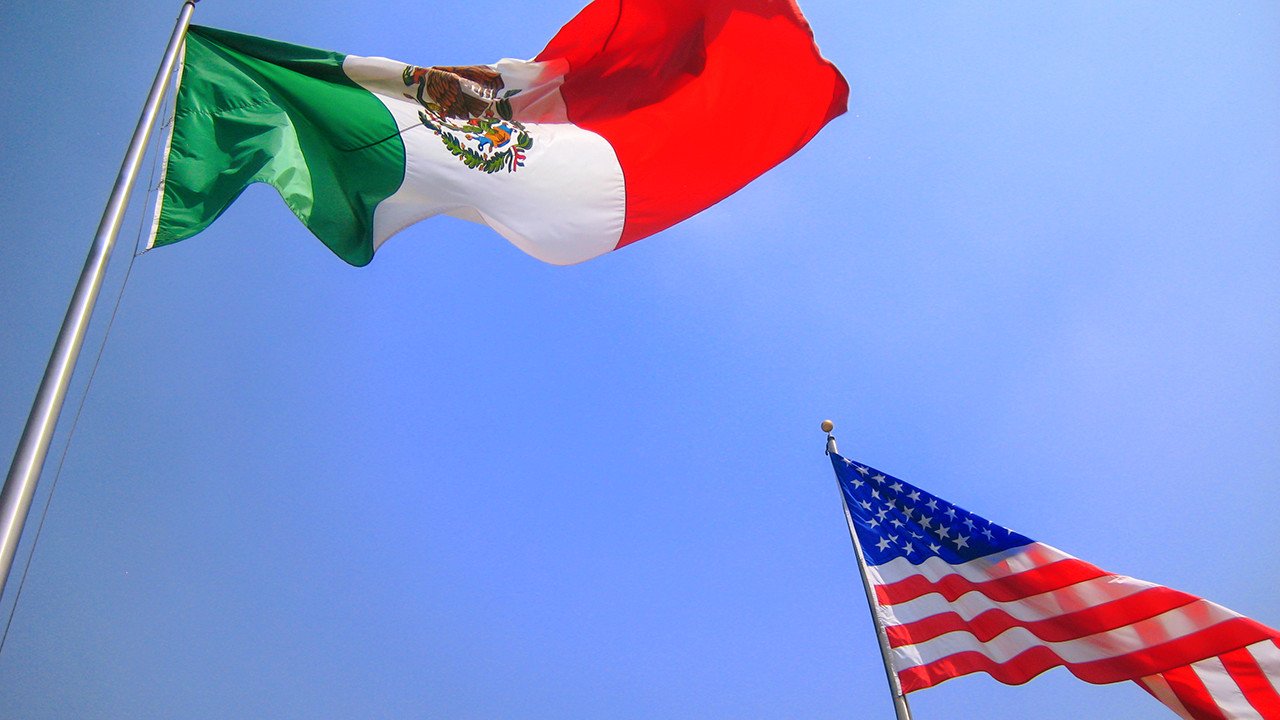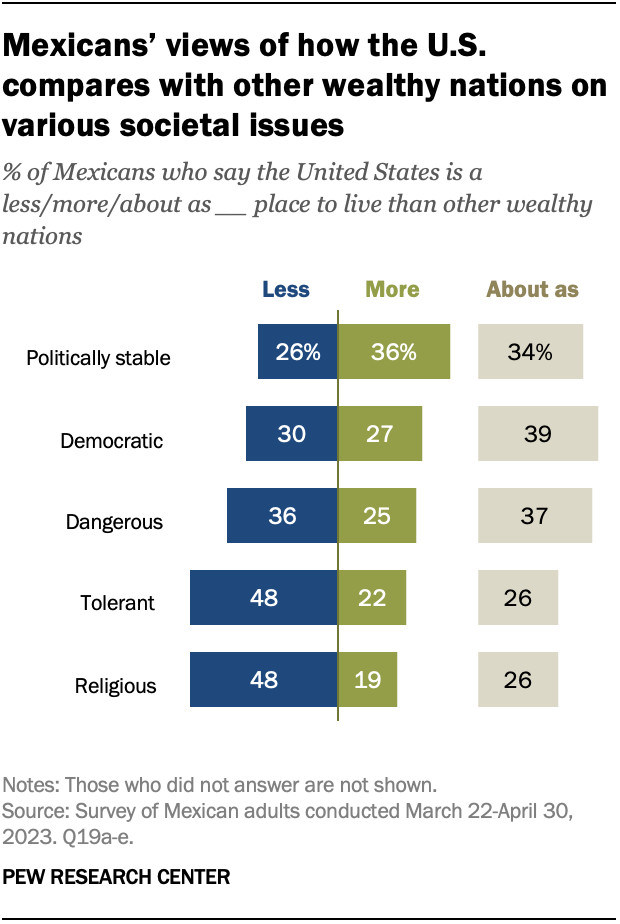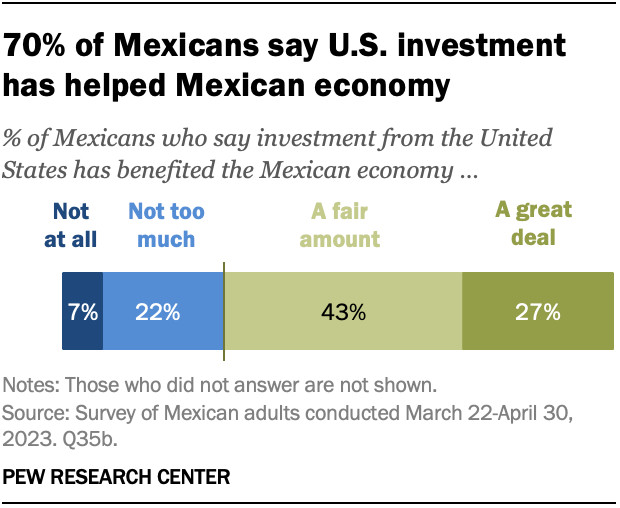Mexico’s relationship with other countries is a complex tapestry woven with threads of history, culture, economics, and politics. Understanding these dynamics, especially regarding which country Mexico might harbor the most animosity toward, requires a nuanced approach. On gaymexico.net, we explore these relationships, focusing on how they impact the LGBTQ+ community and travel experiences in Mexico.
1. Is There a Country That Mexico Hates the Most?
While the term “hate” is strong, historically, the United States has been the country facing the most complex relationship with Mexico. This stems from historical conflicts, economic disparities, and ongoing debates about immigration and border security. However, it’s crucial to understand that despite these challenges, many Mexicans hold favorable views towards the U.S. and recognize its importance as a partner.
1.1 Historical Grievances Contribute to Complex Perceptions
Several historical events have shaped the relationship between Mexico and the United States. The Mexican-American War (1846-1848), resulting in Mexico ceding a significant portion of its territory to the U.S., is a major point of contention. This loss of land, including present-day California, Nevada, Utah, Arizona, and parts of New Mexico, Colorado, Kansas, and Oklahoma, continues to resonate in Mexican national identity.
1.2 Economic Disparities and Dependence Fuel Resentment
The economic relationship between the two countries, while substantial, is often characterized by imbalances. The U.S. is Mexico’s largest trading partner, and Mexico is heavily reliant on the U.S. economy. This dependence can lead to resentment, particularly when economic policies in the U.S. negatively impact Mexico. According to the Office of the United States Trade Representative, the U.S. goods and services trade with Mexico totaled an estimated $780.8 billion in 2022. Exports were $364.9 billion; imports were $415.9 billion.
1.3 Immigration and Border Security Remain Contentious Issues
Immigration is perhaps the most visible and emotionally charged aspect of the U.S.-Mexico relationship. The flow of migrants from Mexico and Central America to the U.S. has been a constant source of debate and tension. Policies aimed at securing the border, such as increased surveillance and the construction of physical barriers, are often viewed negatively in Mexico.
1.4 Shifting Dynamics in Mexican Public Opinion
Despite these challenges, public opinion in Mexico towards the United States is not uniformly negative. According to a Pew Research Center survey conducted in Spring 2023, a majority of Mexicans (63%) have a favorable opinion of the U.S. This indicates a degree of pragmatism and recognition of the benefits of cooperation.
 A Mexican and American flag on flagpoles, representing the complex relationship between the two countries.
A Mexican and American flag on flagpoles, representing the complex relationship between the two countries.
2. What Are Mexicans’ General Views on the United States?
Mexicans hold a mix of opinions about the United States, balancing acknowledgment of opportunities with concerns about U.S. policies and historical events. Recent surveys from the Pew Research Center show a nuanced perspective.
2.1 Acknowledging Opportunities in the U.S.
Many Mexicans believe that moving to the U.S. can lead to a better life. A Pew Research Center survey from 2023 found that 59% of Mexicans think life is better in the U.S. This perception is a major driver of migration, as people seek economic advancement and improved living conditions.
2.2 Favorable Views of U.S.-Mexico Relations
A significant percentage of Mexicans have positive views of the relationship between the two countries. The same Pew Research Center survey revealed that 77% of Mexicans consider U.S.-Mexico relations to be good. This is a notable increase from previous years, suggesting an improved perception of bilateral ties.
2.3 Mixed Feelings About U.S. Policies
Despite generally favorable views, Mexicans are divided on whether the U.S. takes their country’s interests into account when making foreign policy decisions. In the 2023 Pew Research Center survey, 51% of Mexicans said the U.S. considers Mexican interests, while 48% said it does not. This reflects a degree of skepticism about U.S. intentions.
2.4 Comparisons with Other Wealthy Nations
Mexicans compare the U.S. with other wealthy nations both favorably and unfavorably, depending on the issue. While some see the U.S. as more politically stable or democratic, others view it as less tolerant or more dangerous. These comparisons highlight the complexity of Mexican perceptions of the U.S.
2.5 Economic Benefits from U.S. Investment
A majority of Mexicans believe that the Mexican economy has benefited from American investment. According to the Pew Research Center, 70% of Mexicans say the Mexican economy has benefited at least a fair amount from U.S. investment. This acknowledgment of economic benefits contributes to a more balanced view of the U.S.
3. How Do Historical Events Shape Mexican Sentiment?
Historical events significantly influence how Mexicans perceive other countries, particularly the United States. These events have shaped national identity and continue to inform current attitudes.
3.1 The Mexican-American War (1846-1848)
The Mexican-American War remains a pivotal event in shaping Mexican sentiment towards the United States. The loss of a vast territory, including what is now California, Nevada, Utah, Arizona, and parts of New Mexico, Colorado, Kansas, and Oklahoma, is a significant source of historical grievance. This war is often seen as an example of U.S. expansionism at Mexico’s expense.
3.2 The Gadsden Purchase (1854)
The Gadsden Purchase, in which Mexico sold additional land to the United States, further contributed to feelings of exploitation and resentment. While the purchase was intended to facilitate the construction of a southern transcontinental railroad, it was viewed by many Mexicans as another example of the U.S. taking advantage of Mexico’s weakness.
3.3 U.S. Involvement in Mexican Politics
Throughout the 20th century, the U.S. played a significant role in Mexican politics, often supporting regimes that favored American interests. This involvement, while sometimes intended to promote stability, was often seen as interference in Mexico’s internal affairs and contributed to anti-American sentiment.
3.4 The North American Free Trade Agreement (NAFTA)
While NAFTA was intended to promote economic growth, it also led to concerns about the impact on Mexican industries and agriculture. Some Mexicans believe that NAFTA disproportionately benefited the U.S. and contributed to economic inequality in Mexico. According to a report by the Congressional Research Service, NAFTA eliminated most tariffs on products traded between the U.S., Mexico, and Canada.
3.5 Immigration Policies and Border Issues
U.S. immigration policies and border enforcement measures have also shaped Mexican sentiment. The construction of border fences, increased surveillance, and the deportation of Mexican migrants have all contributed to feelings of resentment and mistrust.
4. What Role Does Culture Play in Shaping Opinions?
Culture plays a vital role in shaping opinions and attitudes between Mexico and other countries. Cultural exchanges, traditions, and perceptions all contribute to the complex dynamics.
4.1 Cultural Exchange and Influence
Cultural exchange between Mexico and the United States is extensive, with music, film, television, and cuisine flowing in both directions. While this exchange can promote understanding and appreciation, it can also lead to concerns about cultural dominance and the erosion of Mexican traditions.
4.2 National Identity and Pride
Mexican national identity is deeply rooted in its history, traditions, and values. A strong sense of national pride can sometimes lead to skepticism or resistance towards foreign influences, particularly from countries perceived as culturally dominant.
4.3 Language and Communication
Language differences can create barriers to communication and understanding. While many Mexicans speak English, language barriers can still lead to misunderstandings and misinterpretations.
4.4 Stereotypes and Misconceptions
Stereotypes and misconceptions can significantly influence opinions and attitudes. Negative stereotypes about Mexicans in the U.S. and vice versa can contribute to prejudice and discrimination.
4.5 Media Representation
Media representation plays a crucial role in shaping perceptions. How Mexico and Mexicans are portrayed in U.S. media can influence public opinion and contribute to either positive or negative attitudes.
5. How Does the Economy Impact Mexico’s Relationships?
Economic factors significantly influence Mexico’s relationships with other countries. Trade, investment, and economic policies all play a role in shaping attitudes and perceptions.
5.1 Trade Relations
Trade is a major component of Mexico’s economic relationships. The U.S. is Mexico’s largest trading partner, and trade between the two countries is substantial. However, trade imbalances and concerns about fair trade practices can lead to tensions.
5.2 Foreign Investment
Foreign investment, particularly from the United States, plays a significant role in the Mexican economy. While investment can promote economic growth and create jobs, it can also lead to concerns about foreign control and exploitation.
5.3 Economic Policies
Economic policies in both Mexico and the United States can impact the relationship between the two countries. Policies related to trade, investment, and immigration can all have significant consequences.
5.4 Income Inequality
Income inequality within Mexico and between Mexico and the United States is a major concern. Economic disparities can contribute to social unrest and resentment towards wealthier nations. According to the World Bank, Mexico has one of the highest levels of income inequality among OECD countries.
5.5 Labor Markets
Labor markets in both Mexico and the United States are closely linked. The flow of workers between the two countries is a major factor in the economy, but it can also lead to concerns about exploitation and unfair labor practices.
6. What About Immigration Policies and Their Effects?
Immigration policies and border security measures have a profound impact on Mexico’s relationship with the United States. These policies often spark controversy and shape public opinion.
6.1 Border Security Measures
U.S. border security measures, such as the construction of fences and increased surveillance, are often viewed negatively in Mexico. These measures can be seen as a symbol of mistrust and hostility.
6.2 Deportation Policies
Deportation policies in the U.S. have a significant impact on Mexican families and communities. The deportation of Mexican migrants can lead to economic hardship and social disruption.
6.3 Immigration Reform Debates
Immigration reform debates in the United States often generate controversy in Mexico. Discussions about pathways to citizenship, border security, and enforcement measures can all impact the relationship between the two countries.
6.4 The Dream Act and DACA
The Dream Act and the Deferred Action for Childhood Arrivals (DACA) program have been sources of hope and uncertainty for many Mexican immigrants in the United States. Changes to these programs can have significant consequences for the Mexican community.
6.5 Public Opinion on Immigration
Public opinion on immigration in both Mexico and the United States is complex and often divided. Attitudes towards immigration can be influenced by economic factors, cultural concerns, and political ideologies.
 Line chart displaying Mexicans' views of how the U.S. compares with other wealthy nations on various societal issues, including political stability, democracy, and safety.
Line chart displaying Mexicans' views of how the U.S. compares with other wealthy nations on various societal issues, including political stability, democracy, and safety.
7. Do Political Factors Exacerbate Negative Feelings?
Political factors play a significant role in shaping Mexico’s relationships with other countries. Government policies, political rhetoric, and diplomatic relations all contribute to the dynamics.
7.1 Government Policies
Government policies in both Mexico and the United States can impact the relationship between the two countries. Policies related to trade, immigration, and security can all have significant consequences.
7.2 Political Rhetoric
Political rhetoric from leaders in both countries can shape public opinion and influence the tone of the relationship. Inflammatory or divisive rhetoric can exacerbate tensions and mistrust.
7.3 Diplomatic Relations
Diplomatic relations between Mexico and other countries are essential for managing conflicts and promoting cooperation. Strong diplomatic ties can help to mitigate negative feelings and foster mutual understanding.
7.4 Elections and Political Transitions
Elections and political transitions in both Mexico and the United States can impact the relationship between the two countries. Changes in leadership can lead to shifts in policy and priorities.
7.5 International Organizations
International organizations, such as the United Nations and the World Trade Organization, play a role in mediating disputes and promoting cooperation between Mexico and other countries.
8. What About Mexico’s Relationship with Other Latin American Countries?
Mexico’s relationship with other Latin American countries is generally positive, characterized by cultural affinity, shared history, and regional cooperation. However, some tensions and challenges exist.
8.1 Cultural Affinity
Cultural affinity is a major factor in Mexico’s relationships with other Latin American countries. Shared language, traditions, and values promote understanding and cooperation.
8.2 Regional Cooperation
Mexico is an active participant in regional organizations and initiatives aimed at promoting economic development, security, and cooperation in Latin America.
8.3 Economic Competition
Economic competition can sometimes lead to tensions between Mexico and other Latin American countries. Competition for trade, investment, and resources can create challenges.
8.4 Migration Flows
Migration flows within Latin America can also impact relationships. Mexico is both a source and a destination for migrants from other Latin American countries, and migration issues can sometimes lead to tensions.
8.5 Political Ideologies
Political ideologies can play a role in shaping relationships between Mexico and other Latin American countries. Differences in political systems and ideologies can sometimes lead to conflicts.
9. How Does Mexico View European Countries?
Mexico’s relationship with European countries is generally positive, characterized by trade, investment, and cultural exchange. However, some historical grievances and economic disparities exist.
9.1 Trade and Investment
Trade and investment are major components of Mexico’s relationships with European countries. European investment in Mexico is substantial, and trade between the two regions is growing.
9.2 Cultural Exchange
Cultural exchange between Mexico and Europe is extensive, with art, music, and literature flowing in both directions. This exchange promotes understanding and appreciation.
9.3 Historical Grievances
Historical grievances related to colonialism and European involvement in Latin America can sometimes impact relationships. However, these grievances are generally less pronounced than those related to the United States.
9.4 Economic Disparities
Economic disparities between Mexico and European countries can lead to concerns about fair trade practices and exploitation. However, these concerns are generally less pronounced than those related to the United States.
9.5 Political Cooperation
Political cooperation between Mexico and European countries is generally positive, with both sides working together on issues such as climate change, human rights, and security.
10. What Are the Current Issues Affecting These Relationships?
Several current issues affect Mexico’s relationships with other countries. These issues include trade disputes, immigration policies, and security concerns.
10.1 Trade Disputes
Trade disputes can arise between Mexico and other countries over issues such as tariffs, quotas, and intellectual property rights. These disputes can strain relationships and disrupt economic activity.
10.2 Immigration Policies
Immigration policies in other countries can impact Mexico’s relationship with those countries. Policies related to border security, deportation, and immigration reform can all have significant consequences.
10.3 Security Concerns
Security concerns related to drug trafficking, organized crime, and terrorism can impact Mexico’s relationships with other countries. Cooperation on security issues is essential for addressing these challenges.
10.4 Human Rights Issues
Human rights issues, such as police brutality, corruption, and violence against journalists, can impact Mexico’s relationships with other countries. Concerns about human rights can lead to criticism and pressure for reform.
10.5 Climate Change
Climate change is a global issue that affects Mexico’s relationships with other countries. Cooperation on climate change mitigation and adaptation is essential for addressing this challenge.
 Bar chart illustrating that 70% of Mexicans believe U.S. investment has helped the Mexican economy, highlighting a key aspect of their relationship.
Bar chart illustrating that 70% of Mexicans believe U.S. investment has helped the Mexican economy, highlighting a key aspect of their relationship.
Navigating Mexico’s complex relationships requires understanding the historical, cultural, economic, and political factors that shape opinions and attitudes. While historical grievances and current challenges exist, many Mexicans maintain favorable views towards other countries and recognize the benefits of cooperation. For LGBTQ+ travelers, understanding these dynamics can enhance their experience and promote a more inclusive and respectful visit. Visit gaymexico.net for more insights and resources.
FAQ: Mexico and Its Relationships with Other Countries
Q1: Does Mexico hate any country the most?
While “hate” is a strong word, historically, the United States has had the most complex relationship with Mexico due to historical conflicts, economic disparities, and immigration issues. However, many Mexicans still hold favorable views towards the U.S.
Q2: What are some historical events that shaped Mexican sentiment towards the U.S.?
Key events include the Mexican-American War (1846-1848), the Gadsden Purchase, and U.S. involvement in Mexican politics during the 20th century. These events have contributed to feelings of resentment and mistrust.
Q3: How do Mexicans generally view the United States?
Mexicans have mixed opinions. Many acknowledge opportunities in the U.S. and recognize the benefits of economic investment, but they are divided on whether the U.S. takes Mexico’s interests into account when making foreign policy decisions.
Q4: What role does culture play in shaping opinions between Mexico and other countries?
Cultural exchange can promote understanding but also lead to concerns about cultural dominance. National identity, language, stereotypes, and media representation all significantly influence opinions.
Q5: How does the economy impact Mexico’s relationships, especially with the U.S.?
Trade, foreign investment, and economic policies significantly influence relationships. Trade imbalances, income inequality, and labor market dynamics can lead to tensions.
Q6: How do immigration policies affect Mexico’s relationship with the U.S.?
U.S. border security measures, deportation policies, and immigration reform debates often spark controversy and shape public opinion in Mexico.
Q7: What is Mexico’s relationship with other Latin American countries like?
Mexico generally has positive relationships with other Latin American countries, characterized by cultural affinity and regional cooperation. However, economic competition and migration flows can sometimes create tensions.
Q8: How does Mexico view European countries?
Mexico’s relationship with European countries is generally positive, characterized by trade, investment, and cultural exchange. Historical grievances are less pronounced compared to the U.S.
Q9: What are some current issues affecting Mexico’s relationships with other countries?
Current issues include trade disputes, immigration policies, security concerns related to drug trafficking, human rights issues, and climate change.
Q10: Where can I find more information about LGBTQ+ travel and culture in Mexico?
Visit gaymexico.net for comprehensive, up-to-date, and reliable information about LGBTQ+ travel, events, and community connections in Mexico.
Ready to explore the vibrant and welcoming culture of Mexico? Visit gaymexico.net to discover LGBTQ+-friendly destinations, events, and valuable resources. Connect with a community that celebrates diversity and experience the best of Mexico with confidence and pride. Your adventure awaits – start planning now! Address: 3255 Wilshire Blvd, Los Angeles, CA 90010, United States. Phone: +1 (213) 380-2177.
